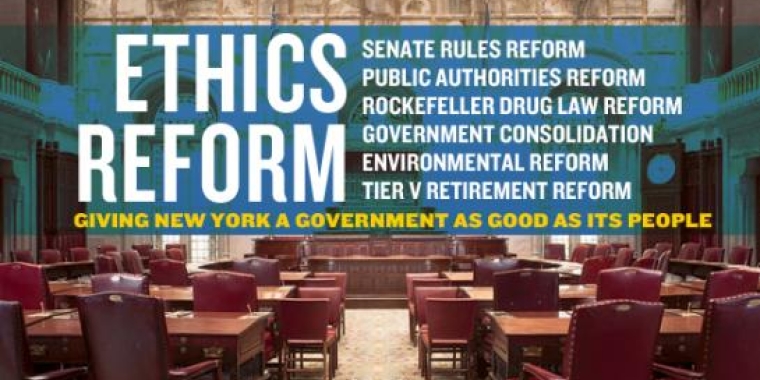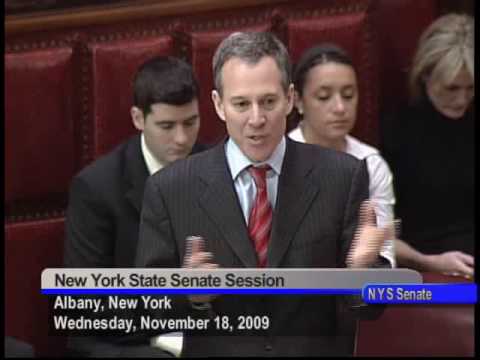Senate Passes Sweeping Ethics And Election Law Reform Legislation
Eric T. Schneiderman
January 20, 2010
-
ISSUE:
- Ethics
-
COMMITTEE:
- Codes

Schneiderman bill includes stricter campaign finance rules and greater penalties for violations, increased disclosure of outside income for legislators, enhancements to the lobby law, strengthened legislative and executive oversight
ALBANY – In an historic victory for public integrity, the State Senate today passed sweeping ethics and election law reform by a vote of 59-1. The legislation (S.6457), sponsored by Senator Eric T. Schneiderman and Assembly Speaker Sheldon Silver, includes provisions that would require greater disclosure from lobbyists and lobbying clients, create an investigative body for legislative ethics, restore independent commissions for the executive branch and lobbying, provide greater information regarding legislators’ outside sources of income, empower the New York State Board of Elections to enforce campaign finance laws and increase penalties for campaign finance violations.
“I am very proud of the fact that, in our first days back in session, we’ve passed the most sweeping ethics reforms in a generation. This is monumental. For decades, the problem has not been what’s illegal in Albany, but what’s legal. That's all about to change. These reforms will restore public confidence in our government through stricter campaign finance rules, increased transparency and meaningful ethics oversight of lawmakers. The message to all the well-connected lobbyists and legislators who have benefited from Albany's pay-to-play culture is clear: the party is over,” said Sen. Eric Schneiderman, the lead sponsor of the bill.
The bill passed by the Senate revamps current ethics law by requiring lobbyists and lobbying clients to report business relationships with public officials. Legislators would also be required to reveal in greater detail their sources of outside income. In addition, the Legislative Ethics Commission would be divided into both a commission for enforcement and an office for investigations, and the Commission on Public Integrity would be replaced by two separate six-member commissions to oversee ethics compliance in the executive branch and for lobbying. The new commissions overseeing the executive and legislative branches would both take effect on July 31, 2010. The enhanced disclosure requirements would take effect January 1, 2011. The new commissions would sunset on July 31, 2014.
Executive Ethics and Compliance Commission
Currently, the Commission on Public Integrity oversees ethics compliance by the executive branch and the governor has the majority of appointees. The ethics reform legislation would replace this body and create a six-member Executive Ethics and Compliance Commission (EECC), made up of two appointees each by the governor, the comptroller and the attorney general—the governor will not have the majority of appointees for the first time. The members would appoint an executive director, who would serve a three-year term and could only be removed by a majority vote of the board.
Commission on Lobbying Ethics and Compliance
This legislation would restore an independent state commission on lobbying that would consist of six commissioners: two appointed by the governor and one by each of the legislative leaders. The members would appoint an executive director, who would serve a three-year term and could only be removed by a majority vote of the board.
The legislation would:
Institute a review process of annual statement of financial disclosure whereby either random reviews would be conducted by the commission overseeing the legislative and executive branches, or all members of a class—members of the legislature, statewide elected officials, commissioners and deputy commissioners, and other state officers and employees, legislators and legislative staff-- would be subject to review.
Expand the definition of lobbying to include “resolutions”:
Further define a “widely attended event” as a gathering related to the attendee’s duties or responsibilities in which at least 25 people are invited or expected to attend, not including individuals from the government entity in which the public officer serves; and
Add new language to define “nominal food and beverages not part of a meal” valued under $10.
Executive Ethics and Compliance Commission
Currently, the Commission on Public Integrity oversees ethics compliance by the executive branch. The ethics reform legislation would replace this body and create a six-member Executive Ethics and Compliance Commission (EECC), made up of two appointees each by the governor, the comptroller and the attorney general. The members would appoint an executive director, who would serve a three-year term and could only be removed by a majority vote of the board.
Additionally, this legislation would:
Prevent individuals from serving as EECC appointees for five years after working as an executive officer, legislative officer, executive or legislative branch employee or lobbyist in either New York State or other jurisdictions;
Require the commissions to review all financial disclosure statements to ensure that each is complete;
Mandate that financial disclosure statements of elected officials be posted on the EECC website; and,
Institute a review process whereby either random reviews would be conducted by the EECC, or all members of a class-- statewide elected officials, commissioners and deputy commissioners, and other state officers and employees, legislators and legislative staff-- would be subject to review.
Joint Legislative Commission on Ethics Standards and the Legislative Office of Ethics Investigation
The ethics reform legislation passed today would separate the Legislative Ethics Commission into two bodies.
The first, the Joint Legislative Commission on Ethics Standards (JLCES), would be the ethics compliance arm. Legislative leaders would appoint two members each, including four legislators and four non-members. This body would be responsible for conducting ethics training and education for legislative staff, issuing advisory opinions and imposing penalties for violations of the public officers’ law.
The legislation would:
Prevent individuals from serving as JLCES appointees for five years after working as legislative officer, legislative employee or lobbyist in either New York State or other jurisdictions, excluding the four legislators serving on the board;
Require the JLCES to review all financial disclosure statements to ensure that each is complete;
Mandate that financial disclosure statements of elected officials be posted on the JLCES website; and,
Institute a review process whereby either random reviews would be conducted by the JLCES, or all members of a class-- statewide elected officials, commissioners and deputy commissioners, and other state officers and employees, legislators and legislative staff-- would be subject to review.
The second body, the Legislative Office of Ethics Investigation (LOEI) would also be governed by an eight-member board. Each legislative leader would have two appointees, and legislators and legislative staff would be prohibited from serving on the board.
This body would:
Receive complaints about ethics violations from the public and referrals of cases for investigation from the JLCES and the Senate and Assembly Standing Committees on Ethics, and complaints about ethics violations from the public;
Send final reports to the JLCES; and
Publicize reports in which cases are not dismissed or in dismissals when that decision is inconsistent with the decision of the JLCES.
The legislation would also require the appropriate legislative oversight body to conduct a hearing on the effectiveness of these provisions within six months of the sunset date of the legislation.
Financial Disclosure
This bill would increase financial disclosure requirements by splitting an existing category into two new categories on financial disclosure forms. The first would cover amounts between $250,000 and $1 million; the other would cover amounts of $1 million or more.
Additionally, the legislation would:
Remove the provisions of current law that make categories of value confidential;
Require additional disclosure with respect to consulting services, business before the state and licensed professions; and
Clarify language to indicate that deferred compensation plans must be disclosed.
Ethics Reports
Under this legislation, the Committee on Open Government would prepare an annual report summarizing the actions of the JLCES, LOEI, EECC, the State Commission on Lobbying and the Senate and Assembly Standing Committees on Ethics.
Campaign Finance
To promote increased enforcement of campaign finance reform laws, the legislation creates an enforcement unit within the New York State Board of Elections (BOE) and mandates that at least 35 percent of the board’s annual budget be dedicated to the unit. Additionally, it expands the jurisdiction of the enforcement unit and promotes the independence of the enforcement counsel by making the office a four-year term. The legislation also promotes compliance with campaign finance laws by increasing current penalties and creating new penalties for violations, and requires greater disclosure and transparency of campaign finance information.
The legislation would:
Require three of the four BOE commissioners to vote to stop an investigation by the enforcement counsel, rather than requiring, as current law does, three votes to begin an investigation;
Mandate that all votes to stop an investigation or to act on the recommendation of the enforcement counsel after an investigation occur in public;
Add an additional campaign finance filing for candidates and political committees during the legislative session and increase the penalty for failure to file from $500 to $1,000;
Create a substantial penalty of up to $10,000 for the failure to file required statements three or more times in an election cycle;
Create a new penalty for accepting an excess contribution. In addition to returning the excess, a candidate or committee could be fined an amount equal to two times the excess plus a civil penalty up to $10,000;
Define and require independent expenditures to identify the source of a political communication and penalize violators up to $1,000 or the cost of the independent expenditure, whichever is greater;
Mandate that independent expenditures on communications opposing or supporting a candidate or ballot initiative in excess of $1,000 be subject to the same filing requirements currently in place for candidates and political committees;
Prohibit a person, campaign committee or political party from falsely identifying the source of a political communication; and
Require itemization of candidate and political committee credit card payments and other like payments.
Share this Article or Press Release
Newsroom
Go to NewsroomHope for the Wrongfully Convicted
November 22, 2009
Senate Protects Children From Drunk Drivers
November 19, 2009
Sen. Schneiderman Debating Leandra's Law
November 19, 2009
